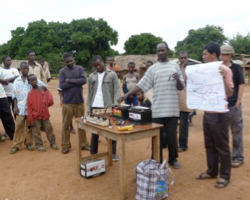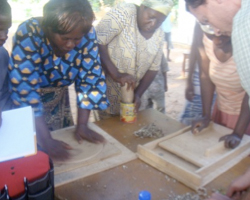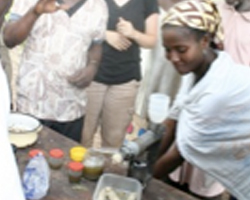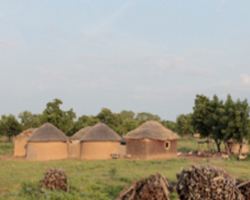|
INTERNATIONAL DEVELOPMENT DESIGN SUMMIT
July 7 – August 9, 2014 Conference was held in Tanzania.
FOR MORE INFORMATION: http://iddsummit.org/
IDDS 2013 GHANA DESIGN PROJECTS UPDATE AT 2014 CONFERENCE WILL INCLUDE:
In Ghanaian villages without electricity, many people have mobile phones, but it is difficult to charge them. Villagers must travel far and pay 0.50 cedis ($0.35, about the cost of a simple meal) to charge their phones. The battery charging team has built upon and incorporated ideas from villagers to create a prototype to charge phones from a car battery, reducing distance and cost. Original Challenge: Mobile phones, radios, and lights are common electronic devices that are invaluable to rural inhabitants. Almost all of these are powered by batteries which are expensive and disposable or require electricity to charge. According to the International Energy Administration, only 25% of rural Ghanaians are connected to a national electricity grid, which limits the ability to charge batteries and thus limits the use of battery-powered devices. For this project, a team will create a product or service to address the challenges of battery usage in rural areas along with a viable business plan.
The User Generated Content team is working to bring the power of Internet-like search to farmers across developing countries, many of whom have minimal formal education and are technologically challenged. The team is developing a voice-based and search-enabled social community, whereby farmers can retrieve knowledge on-demand and share best practices using their mobile phones. The solution is being co-created with users to help farmers grow both their crops and their incomes. Original Challenge: Around the world, sharing information through user-generated content has become a powerful movement for positive social change. A wide variety of practices, knowledge and stories reside with the people of Ghana, yet there are currently few outlets for sharing this information outside one's immediate circle of personal acquaintances. Even when information is available, it may not be easily accessible or in an appropriate language. This project is to develop a tool to facilitate the collection and sharing of broadly accessible user-generated content with a focus on traditional knowledge, and a viable business model for the tool and/or associated service.
The moringa team is working to improve the livelihood of small-scale farmers by creating a device to shell moringa seeds for oil extraction. In order to maximize the oil extraction from the seeds, shelling seeds is necessary before extraction. Moreover, farmers can also get higher prices from selling the shelled seeds to oil producers. Original Challenge: Moringa oliefera is a tree which is growing in importance in Ghana. It is considered one of the world's most useful trees, as almost every part of the tree can be used for food or has another beneficial property. The leaves in particular are highly nutritious, and a significant source of vitamin C, vitamin A, iron, protein, and potassium. The oil from the seeds is edible and also has medicinal and cosmetic uses. Moringa is a promising source of income and employment for Ghanaians. This project is to identify a market opportunity for a product derived from moringa, design and build the necessary processing equipment, and develop a viable business model.
The oil team is working with Ghanaian communities to help them generate income from locally available resources. To do this, they have developed an oil extraction machine for moringa and other oilseeds. Now they are working with the community to establish this venture. Original Challenge: Oil extraction from local crops provides a significant opportunity for income generation. Many communities already extract oil from plants such as the kapok tree, shea tree, and other local plants. Some plants have very valuable seeds, including neem, moringa, and many other nuts and seeds found in Ghana. This project is to identify a market opportunity for local use or export of an oil or oil-related product, to develop the technology needed to extract it and to create an enterprise to produce and sell the product.
The biomass team is developing a low cost gasification system using agricultural waste for rural electrification in Ghana and other developing countries. The current prototype is a two chamber gasifier, in which the outer drum contains a fire to heat the inner closed chamber. The produced gas is fed to a petrol engine, which is adapted to also run on syngas and used to generate electricity. Original Challenge: Access to electricity brings numerous benefits including improvements in education, income, health, and gender equity. Yet, in Sub-Saharan Africa, 585 million people do not have access to electricity, and the rural electrification rate is only 14%, according to the International Energy Administration. While Ghana has a higher rate than its neighbors, only 25% of Ghanaian villages are electrified. There is an opportunity to provide rural communities with access to electricity using small-scale systems powered by biomass. Water hyacinth, dung, cassava leaves, urban refuse, agricultural residues and sewage are potentially viable feedstocks in Ghana. For this project, the challenge is to develop and prototype such a system and a business plan model to make it viable.
The farmers team is working to help increase the income of small-scale groundnut (peanut) farmers by speeding up the harvesting process. They are creating inexpensive devices that quickly remove groundnuts from roots of the plant. Original Challenge: Agriculture through smallholder farming is an essential source of income and livelihood in rural Ghana.90% of small-scale farmers grow primarily rain-fed crops on less than 2 hectares of land. Smallholder farms produce relatively low crop volumes, and the lack of access to improved seeds, fertilizers, irrigation, and machinery further limits harvest yields. Once harvested, inadequate transport, storage, and marketing restricts farmers' access to markets. This project is to identify and develop a product and venture model that increases the income of smallholder farmers.
The artisans team is developing a toy loom inspired by the traditional Ghanaian Kenta weaving method. This loom is intended for children to learn new skills and get in touch with their cultural values through play. Original Challenge: Ghana has a rich history of traditional crafts including weaving, dying and printing of textiles, metal casting, bead making, and wood carving. These crafts provide a valuable source of income to Ghanaian artisans, however there may be ways to increase output and income or decrease burdensome labor while preserving the traditions and cultural significance of the crafts they make. This project is to create a product that will increase the productivity of artisans and develop a feasible business model for the product.
The bamboo team is developing a low-cost treatment technology to transform bamboo into a desirable material, building a venture model around selling the process and providing the training to communities to use the treatment system, along with training in the concept's of design development to create market appropriate products such as low cost farm tools trough the ideas of co-creation. Original Challenge: Bamboo is a sustainable and fast-growing plant that grows well in Ghana. It has exceptional strength, absorption, anti-microbial and other properties. Bamboo can be used to make a wide variety of products for abundant resource to create a sustainable source of income. Increased use of bamboo could also reduce the rate of deforestation, which is reported to be an estimated 3% per year in Ghana. This project is to identify a market opportunity for a product made from bamboo, design and build the equipment needed to make it, and develop a viable business model for it.
This team is developing a new method of reducing malaria, an LED lantern that repels mosquitoes using a neem oil mixture. The lantern will be used at night, when mosquitoes are most active, and harness local neem tree resources. Original Challenge: Original Challenge: Malaria is responsible for over 40% of the disease burden in Ghana and is the most commonly reported reason for out-patient visits to rural hospitals. Treated bed nets have been shown to be an effective way to reduce malaria. However, only 28% of Ghanaian children at risk for malaria sleep under an insecticide treated net, according to the World Health Organization, and there are few interventions targeted specifically at protecting children. In this project, the team will identify an opportunity to reduce the incidence of malaria in children and develop a novel product and venture plan to address this challenge.
A brief history of IDSS projects: 2007:
2008:
2009:
2011:
2013:
|
|
|

 Charging Batteries:
Charging Batteries:
 Collecting & Sharing User-Generated Content:
Collecting & Sharing User-Generated Content:
 Generating Income from Moringa:
Generating Income from Moringa:
 Generating Income through Oil Production:
Generating Income through Oil Production:
 Generating Rural Electricity from Biomass:
Generating Rural Electricity from Biomass:
 Increasing Income for Smallholder Farmers:
Increasing Income for Smallholder Farmers:
 Increasing Productivity for Artisans:
Increasing Productivity for Artisans:
 Processing Bamboo:
Processing Bamboo:
 Reducing Malaria in Children:
Reducing Malaria in Children: